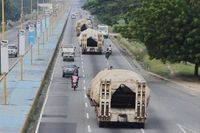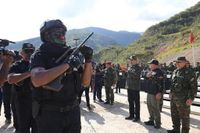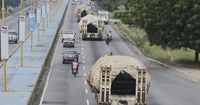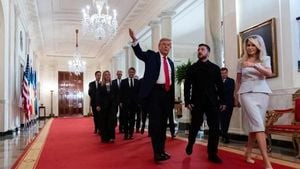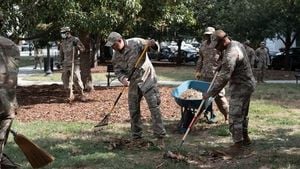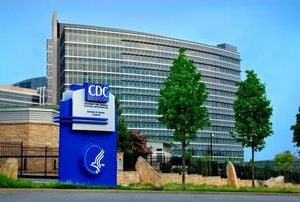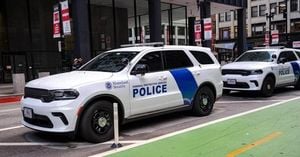On Thursday, August 28, 2025, Venezuela’s President Nicolás Maduro presided over a display of military might in Caracas, overseeing exercises that many observers say underscore the mounting tensions between Venezuela and the United States. The drills, held against a backdrop of warships patrolling the Caribbean, have drawn international attention and stoked anxieties throughout the region. As the world watches, leaders in neighboring Colombia are working overtime to prevent the situation from spiraling into open conflict.
According to reporting from Colombia One and El Espectador, the root of the current standoff traces to the recent deployment of two U.S. naval contingents—including a nuclear submarine—off the coast of Venezuela. The United States has justified the operation as part of its ongoing campaign against drug trafficking and transnational crime, with logistical support from Trinidad and Tobago, a small island nation just east of Venezuela. The sight of American warships so close to Venezuelan shores has rattled nerves, not only in Caracas but across Latin America.
Yet, despite the saber-rattling, Colombian Foreign Minister Rosa Villavicencio sought to tamp down fears of imminent conflict. In an interview published August 28, she told El Espectador that after direct talks with U.S. officials, she is convinced that Washington has no intention of launching a military operation against Venezuela. "After the conversations we have had with the U.S. ambassador to Colombia (John McNamara), with his representatives, and also with the congressmen who visited us a few weeks ago, who are of Colombian descent (Bernie Moreno and Ruben Gallego), we were able to conclude that there is no intention of an intervention," Villavicencio said.
Her statement comes at a delicate moment. Just last week, Colombian President Gustavo Petro issued a stark warning about the dangers of escalation. "A potential U.S. invasion of the neighboring country would be the worst mistake," he said, arguing that such a move would destabilize the entire region and have especially grave consequences for Colombia. With nearly 3 million Venezuelan migrants already residing in Colombia, any military intervention could trigger a humanitarian crisis of even greater proportions.
Villavicencio acknowledged the current climate of uncertainty. "There is a moment of tension" between the Trump administration and the government of Nicolás Maduro, she admitted. But she also emphasized that the U.S. naval presence serves a broader purpose: "They serve a clear purpose against all criminal organizations that increasingly appear stronger, more coordinated, more organized, because our state structures are sometimes much slower than their capabilities." In her view, the ships are part of an international effort to combat crime and illicit organizations, rather than a prelude to war.
Even so, the region remains on edge. The exponential rise in political and military tensions—fueled by aggressive rhetoric and high-profile maneuvers from both Washington and Caracas—has put the entire Caribbean and northern South America on high alert. For Colombia, the stakes could hardly be higher. As a strategic ally of the United States, Colombia would almost certainly be drawn into any conflict, whether as a logistical base or as a direct participant. The human and economic costs, experts warn, could be staggering, exacerbating existing challenges such as internal polarization and the ongoing influx of Venezuelan migrants.
But military tensions aren’t the only source of anxiety in Bogotá. As Villavicencio explained, Colombia is anxiously awaiting a decision from Washington on whether it will maintain the country’s certification in the fight against drug trafficking. This annual review, expected within the next 15 days, carries enormous weight. Certification not only signals U.S. approval of Colombia’s anti-drug policies, but also unlocks millions of dollars in cooperation funds and stabilizes vital trade flows. A negative decision—so-called "decertification"—would deal a major blow to Colombia’s international credibility, undermine security programs, and directly impact the economy.
"There is concern, because we are nearing the certification evaluation, and from our side there is well-documented evidence in the fight against drugs, considering that it has led to military casualties and carries a cost in that sense," Villavicencio told El Espectador. She pointed to Colombia’s crop substitution policy as a particular sticking point in relations with the U.S. While the Petro government has prioritized replacing illicit crops with legal alternatives and formalizing land titles for rural families, the policy remains a source of tension with Washington, which has historically favored more aggressive eradication efforts.
"There are important processes of substitution of illicit-use crops in areas previously influenced by illegal groups that have been engaging in negotiations, as well as actions such as land formalization that allow families who now have titles to access loans, official banking, and thus reduce, to some extent, the trend of coca leaf cultivation growth," Villavicencio explained. She expressed cautious optimism about the outcome: "We are doing well, and I believe we will be certified. The fight against drug trafficking is not easy; it has complexities, such as the fact that we have a difficult geography, the existence of many fragmented groups—some negotiating, others not—the population’s desire for peace, and the lack of resources to address all these needs."
Despite these challenges, Villavicencio defended the Colombian government’s efforts. "We are managing things in the best way possible, trying to align all institutions so that we can move from illicit economies to legal ones, and that is something well-regarded by the countries collaborating in the implementation of the Peace Accords, as well as by intergovernmental organizations and other states that also support the fight against drug trafficking," she said, underscoring the administration’s commitment to reform and international cooperation.
For Colombia, the twin specters of regional conflict and U.S. decertification represent the most immediate threats to its political, economic, and social stability. A military escalation on the border with Venezuela would transform Colombia from a bystander to a central player in a regional crisis, with all the attendant risks. At the same time, failure to secure U.S. certification would jeopardize critical funding and partnerships, potentially weakening the country’s ability to address its own internal security and development challenges.
As the world waits for Washington’s next move and watches the warships off Venezuela’s coast, Colombia’s leaders are left to navigate a perilous diplomatic tightrope. They must balance their alliance with the United States, their commitment to regional peace, and the urgent needs of millions of citizens—both Colombian and Venezuelan—who would bear the brunt of any miscalculation. For now, at least, dialogue and diplomacy remain at the forefront. Whether that will be enough to keep the peace in a region long plagued by upheaval is a question only time can answer.
